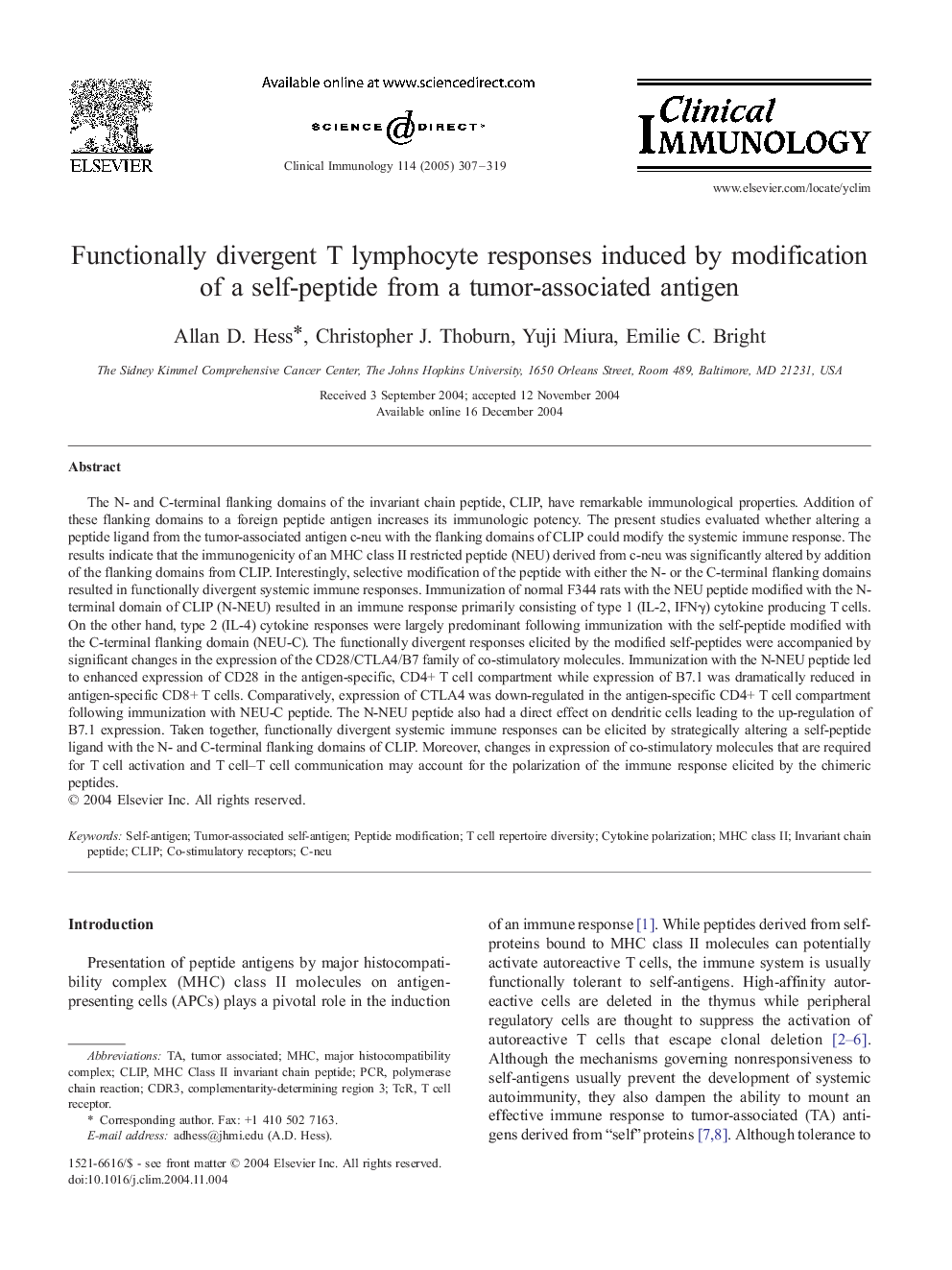| کد مقاله | کد نشریه | سال انتشار | مقاله انگلیسی | نسخه تمام متن |
|---|---|---|---|---|
| 9236718 | 1207487 | 2005 | 13 صفحه PDF | دانلود رایگان |
عنوان انگلیسی مقاله ISI
Functionally divergent T lymphocyte responses induced by modification of a self-peptide from a tumor-associated antigen
دانلود مقاله + سفارش ترجمه
دانلود مقاله ISI انگلیسی
رایگان برای ایرانیان
کلمات کلیدی
TCrCDR3MHC class II - MHC کلاس IIPeptide modification - اصلاح پپتیدSelf-antigen - خود آنتی ژنMHC - مجموعه سازگاری بافتی اصلیmajor histocompatibility complex - مجموعه سازگاری بافتی اصلیComplementarity-determining region 3 - منطقه تعریف مکمل 3polymerase chain reaction - واکنش زنجیره ای پلیمرازPCR - واکنش زنجیرهٔ پلیمرازClip - کلیپT cell receptor - گیرنده سلول T
موضوعات مرتبط
علوم زیستی و بیوفناوری
ایمنی شناسی و میکروب شناسی
ایمونولوژی
پیش نمایش صفحه اول مقاله

چکیده انگلیسی
The N- and C-terminal flanking domains of the invariant chain peptide, CLIP, have remarkable immunological properties. Addition of these flanking domains to a foreign peptide antigen increases its immunologic potency. The present studies evaluated whether altering a peptide ligand from the tumor-associated antigen c-neu with the flanking domains of CLIP could modify the systemic immune response. The results indicate that the immunogenicity of an MHC class II restricted peptide (NEU) derived from c-neu was significantly altered by addition of the flanking domains from CLIP. Interestingly, selective modification of the peptide with either the N- or the C-terminal flanking domains resulted in functionally divergent systemic immune responses. Immunization of normal F344 rats with the NEU peptide modified with the N-terminal domain of CLIP (N-NEU) resulted in an immune response primarily consisting of type 1 (IL-2, IFNγ) cytokine producing T cells. On the other hand, type 2 (IL-4) cytokine responses were largely predominant following immunization with the self-peptide modified with the C-terminal flanking domain (NEU-C). The functionally divergent responses elicited by the modified self-peptides were accompanied by significant changes in the expression of the CD28/CTLA4/B7 family of co-stimulatory molecules. Immunization with the N-NEU peptide led to enhanced expression of CD28 in the antigen-specific, CD4+ T cell compartment while expression of B7.1 was dramatically reduced in antigen-specific CD8+ T cells. Comparatively, expression of CTLA4 was down-regulated in the antigen-specific CD4+ T cell compartment following immunization with NEU-C peptide. The N-NEU peptide also had a direct effect on dendritic cells leading to the up-regulation of B7.1 expression. Taken together, functionally divergent systemic immune responses can be elicited by strategically altering a self-peptide ligand with the N- and C-terminal flanking domains of CLIP. Moreover, changes in expression of co-stimulatory molecules that are required for T cell activation and T cell-T cell communication may account for the polarization of the immune response elicited by the chimeric peptides.
ناشر
Database: Elsevier - ScienceDirect (ساینس دایرکت)
Journal: Clinical Immunology - Volume 114, Issue 3, March 2005, Pages 307-319
Journal: Clinical Immunology - Volume 114, Issue 3, March 2005, Pages 307-319
نویسندگان
Allan D. Hess, Christopher J. Thoburn, Yuji Miura, Emilie C. Bright,